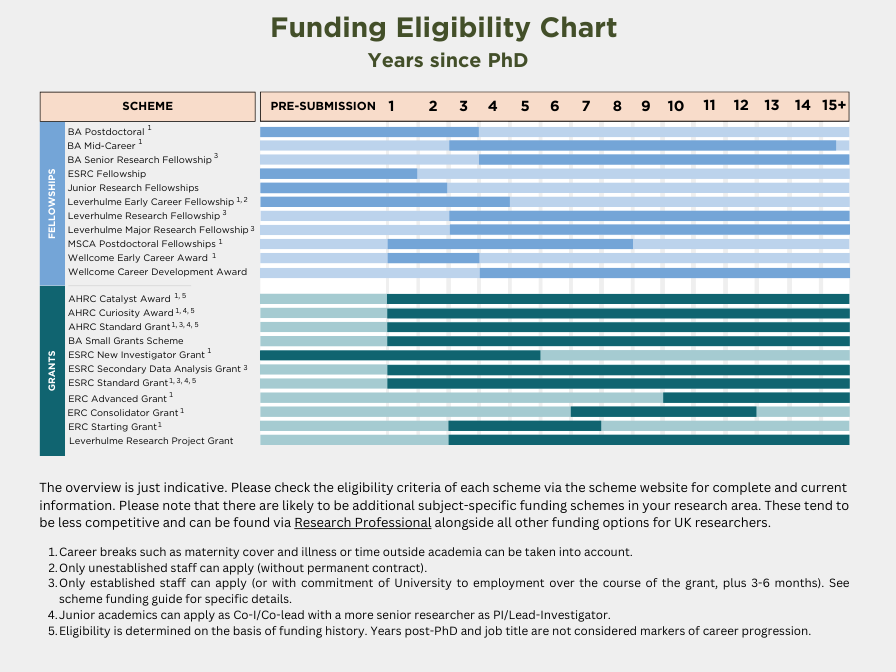1. Find a scheme
Your Faculty or Department will alert you to many of the major funding schemes via email, but it’s also worth doing your own research. The AHSS research website (ahssresearch.group.cam.ac.uk) is a good starting point; here, you can find the latest funding scheme timetable, which gives an overview of upcoming funding calls. It’s also worth keeping an eye on the major funder pages for updates: UKRI, Leverhulme, ERC, and the British Academy are good places to start. Third-party resources, which compile lists of funding sources, are also available, such as the Research Professional database (free for members of the University). Bear in mind that all schemes will have specific eligibility criteria that you will need to meet in order to apply.
2. Check your eligibility
Common eligibility criteria for candidates include nationality/residency, employment status, and years of postdoctoral experience, but others may apply. Project eligibility criteria may entail restrictions on the types of expenses that can be claimed and the type of activities that can be carried out. Make sure you understand and fully meet these before you start preparing your proposal. You’ll find a guide to scheme eligibility by postdoctoral experience on page 8, below. If you’re unsure about your eligibility, do get in contact with one of the School’s Research Facilitators, your Departmental Administrator, or your Faculty’s Research Grants Administrator, who may be able to help.
3. Prepare your proposal
Contact your Faculty’s Research Grant Administrator as early as possible to discuss the project. They will be able to provide support with producing the budget and filling out the application forms, and to advise how complete an application will have to be before it can be assessed for departmental approval. Contact a School Research Facilitator to discuss your project ideas – and how they fit with funder priorities and requirements – and to obtain feedback on proposal drafts. All funders will provide details of the application process, what the scheme will fund, and their requirements for proposals on their websites. You should read through the relevant documents for each scheme carefully before you begin writing. Discuss the costing of the proposal with your Research Grant Administrator, who will compile the Worktribe costings required by the Research Operations Office.
4. Seek as much feedback as possible
Seek internal peer review either informally by approaching individuals or by using the formal peer review structures where applicable. Ask your academic mentor or other colleagues for feedback. Contact Research Facilitators about use of the university’s peer review procedures (for AHRC and ESRC only). Send proposal drafts to Research Facilitators for feedback.
5. Obtain departmental approval
Hosting research always entails a departmental commitment in terms have of space, human resources, and risk. It’s therefore essential that you obtain departmental approval before submitting any grant application. In cases where approval has not been properly sought and given, it may be necessary for a successful award to be declined. University approval is also required for many schemes; this will not be confirmed until departmental approval is received. The approval process varies somewhat across differing Departments and Faculties, but, in general, it is a good idea to seek approval or discuss it with your Research Grant Administrator as early as possible.
6. Submit – on time and with institutional approval
Most funders will require you to complete an online application form, but some will have a specific email address to which application documents must be sent. Where an online portal submission is required, clicking ‘Submit’ will usually forward the application to the Research Operations Office first so that they can check it against the Worktribe costing and provide institutional approval. Where there is no portal, completed application documents must first be sent to the Research Operations Office manually (via the RGA) so that they can be checked and approved before final submission. The ROO will ensure that the department’s expectation of the project matches what is being submitted and check for errors to identify any issues that could cause the application to be rejected. Full applications must be submitted to the ROO at least five working days ahead of the final deadline. Extended checks of application content will be provided if the proposal is submitted to the ROO at least seven working days in advance of the funder’s deadline.




